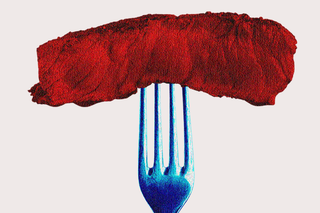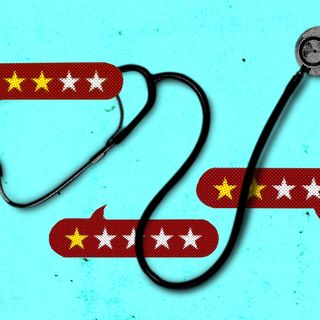
Studies Linking Diet With Health Can Be Conflicting. Scientists Propose a System to Rate the Evidence
Scientists have proposed a star rating system that aims to help people make personal health decisions, inform health policy, and guide future research.

Does red meat consumption increase the risk of Type-2 diabetes? What about the possible health benefits of coffee? How strong are the correlations between smoking and cancer? Can consuming a lower amount of vegetables lead to ischemic heart disease?
When it comes to linking dietary choices and patterns to impacts on health, research findings have often been conflicting. The weekly barrage of health news does little to stem the noise. Themedia regularly doles out health advice based on studies that tell you a certain dietary component is good for health one day, and bad the next. This leaves individuals confused and poses a significant problem in public health messaging.
Now, a team of researchers at the Institute for Health Metrics and Evaluation (IHME) are attempting to address this. They devised a star-based rating system to assess the quality of evidencein studies that link a behavior with a specific health outcome, such as smoking with lung cancer.
A five-star rating would establish a clear link between the two. A one-star rating, on the other hand, could mean one of two things: Either there is no association between the studied factors or the evidence is too weak to draw a conclusion. Two stars show a low association of the behavior with the potential risk outcome (0-15%), three stars indicate a 15-50% change while four stars indicate a stronger correlation, with a 50-85% change. Such a rating system could simplify the process of assessing a research study’s credibility, while allowing people to make more informed personal health choices.
Related on The Swaddle:
Journal Takes Down Study Suggesting Smoking Lowers Risk of Covid19
“There has been extensive research on the links between various risks and health outcomes, but findings are often very different across studies,” said Dr. Christopher Murray, Director of IHME and a lead author of the study. “One of the goals of this new star rating system is to clear up confusion and help consumers make informed decisions about diet, exercise, and other activities that can affect their long-term health.”
This confusion due to inconsistent findings across studies is seen in red meat consumption. Many reports, including the Global Burden of Diseases, Injuries, and Risk Factors Study (2019), have associated the consumption of unprocessed red meat with several illnesses—type 2 diabetes, breast and colon cancer as well as heart disease. This has led to advisories asking individuals to limit their intake of unprocessed red meat.
Other researchers, however, were not convinced. In a letter published in The Lancet, academics raised questions about the rise in deaths attributable to red meat intake as outlined by the GBD report, asking that the evidence for it be made public. Meanwhile, another 2019 research study received significant backlash for its conclusion that “low” evidence exists of red or processed meat being harmful. Scientists said this study was based on “flawed methodology and misinterpretation of nutritional evidence”. Such conflicting findings make it difficult to determine whom to believe or what recommendations should be set to limit intake of dietary risk factors. The star rating system, then, attempts to demystify such contradictory research findings.
The team at IHME analyzed existing research in 180 risk-outcome pairs, rating them according to the new metric. Their findings, published in the journal Nature Medicine, gave a five-star rating to the association between smoking and a number of cancers, as well as to the links between high blood pressure and ischemic heart disease — caused due to a narrowing of the blood vessels. However, nearly two-thirds of the risk-outcome pairs (112 out of 180 studied factors) received only a one or two-star rating.
Studies that have tried to establish a link between dietary choices and corresponding health impacts received significantly lower ratings. For example, the links between low vegetable consumption and ischemic heart disease were given a two-star rating, while the association between unprocessed red meat consumption and ischemic stroke received a single star, with IHME researchers stating it causes “potentially no change” in the likelihood of health outcome.
The proliferation of conflicting dietary research proves problematic from a policy perspective too —with recommendations for consumption of certain items varying widely. This territory becomes murkier when conflicts of interest arise. Reports suggest that several studies on nutrition science, promoting health benefits of specific food items, are sponsored by the food industry. These studies also inform nutrition guides and food tracking apps that can significantly alter diets of individuals. In light of such contradictions and biases, an objective way of assessing the credibility of scientific research becomes all the more important.
Related on The Swaddle:
New Research Upends Everything You Know About Diet and Exercise
While conducting the meta-analysis of existing studies, the researchers took into account both the magnitude of the risk as well as the consistency of findings across various studies. The star ratings are based on a conservative interpretation of the existing evidence to remove any bias or errors in the study. These biases could take the form of small sample sizes or differences in methodologies used to draw conclusions.
However, some researchers have raised concerns about the proposed rating method. Dr. Duane Mellor, Dietitian and Senior Teaching Fellow at Aston Medical School told the Science Media Centre how the recent research “may lack the sensitivity and ability to look at how a diet changes as someone eats more or fewer vegetables.”
“Although these analyses are interesting, they perhaps only confirm that it is hard to accurately measure diet, with authors acknowledging that their methods were not able to account for biases in individual studies…,” Mellor said, further adding that relying on studies where food intake is only measured once assumes a snapshot is a reliable picture of an entire diet. While such an approach could work in the case of smoking, where one smokes or does not, diets could prove far more complex as individuals could swap one food item for another. “…[I]t may not be appropriate to measure just one part of the diet on risk of developing disease,” Mellor explained.
As noted in a Nature editorial, this analysis “does not clear up vexing issues such as the risks of red meat or the benefits of vegetables.” Rather, what it does is to help research funders understand the areas where better quality of evidence is needed before a firm conclusion can be drawn.
The star-based rating system, then, could potentially help researchers identify gaps in the existing body of knowledge and guide future research efforts. It could not only aid consumers to make more informed dietary choices, but also provide a useful metric for health policymakers.
As Dr. Emmanuela Gakidou, Professor of Health Metrics Sciences at IHME and a lead author of the study said, “In addition to helping consumers, our analysis can guide policymakers in developing health and wellness education programs, so that they focus on the risk factors with the greatest impact on health… Health researchers can also use this analysis to identify areas where current evidence is weak and more definitive studies are needed.”
Ananya Singh is a Senior Staff Writer at TheSwaddle. She has previously worked as a journalist, researcher and copy editor. Her work explores the intersection of environment, gender and health, with a focus on social and climate justice.
Related


Online Doctor Reviews Are Gender Biased, More Likely to Call Women ‘Cold’: Study
